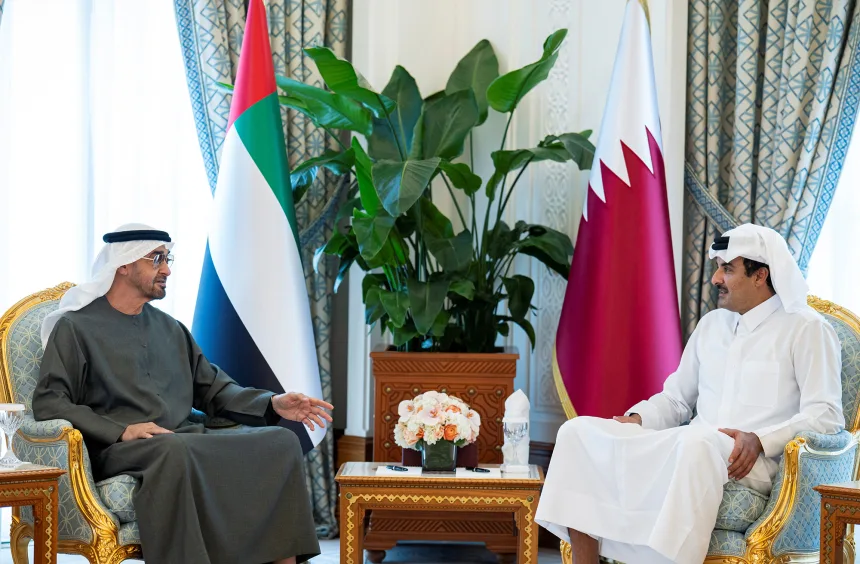
For decades, the wealthy monarchies of the Gulf prided themselves on being islands of stability in a volatile region — building futuristic skylines and attracting millions of foreign workers with promises of safety and prosperity.
That image has been shaken this year. First, Iran struck a US airbase in Qatar after Washington targeted its nuclear facilities in June. Then, this week, Israel shocked the region by targeting Hamas’ political leadership in Doha — marking the first direct Israeli strike on Gulf soil.
The war in Gaza, which began nearly two years ago, is now uncomfortably close to the Gulf’s doorstep.
Qatar has promised a “collective regional response” to the Israeli attack, Prime Minister Sheikh Mohammed bin Abdulrahman Al Thani said in a CNN interview, but admitted that discussions with Gulf partners are still ongoing. A final decision is expected at an Arab-Islamic summit in Doha this weekend.
One of the swiftest responses came from the UAE — the Gulf country with the closest ties to Israel. Within 24 hours of the strike, President Mohammed bin Zayed Al Nahyan arrived in Doha, kicking off a Gulf tour that also took him to Bahrain and Oman. On Friday, Abu Dhabi summoned an Israeli diplomat to condemn what it called a “blatant and cowardly” attack.
Regional analysts say Gulf leaders face a dilemma: they want to show unity and deter future attacks but have few realistic military options to do so.
“We need to take a stand now because if we do not, it will be other Gulf capitals next,” said Bader Al-Saif, assistant professor at Kuwait University.
Diplomatic & Legal Measures
One likely option is diplomatic downgrades. Analysts say the UAE could scale back ties with Israel or even pull back from the Abraham Accords — the US-brokered deal that normalized relations between Israel and several Arab states.
Even before the Doha strike, UAE officials had warned Israel that annexing parts of the West Bank would be a “red line.”
Qatar, meanwhile, is exploring legal avenues. It successfully pushed for a unanimous UN Security Council statement condemning the attack and is reportedly weighing participation in international legal proceedings against Israel — a step Gulf states have historically avoided.
Another option could be for Qatar to suspend its key role as mediator between the US and adversarial states like Iran and the Taliban, analysts say — a move that could complicate Washington’s diplomacy in the region.
Security Coordination
Gulf states could also revive the long-dormant “Peninsula Shield Force,” a collective defense pact signed in the 1980s but rarely used.
“This is the first real test of Gulf security cooperation,” said Abdulaziz Sager, chairman of the Gulf Research Center. He argued that the attack could spur Gulf nations to create a unified military command, integrate air and missile defense systems, and reduce dependence on US protection.
Most Gulf nations host US bases and rely heavily on American weapons, but frustration has been growing over perceived US reluctance to fully defend the region.
Sager suggested that Gulf leaders might now push for stronger and clearer US defense guarantees, with accountability measures if Washington fails to act.
Economic Leverage
With trillions of dollars invested worldwide through sovereign wealth funds, Gulf states have considerable financial clout. Analysts say they could use that leverage by restricting investment flows into companies tied to the Israeli economy or threatening to redirect capital away from the US — which remains Israel’s closest ally.
“The trillions the Gulf states are investing in the US are premised on a secure Gulf,” Al-Saif said. “If we feel insecure, those funds can be diverted to either bolster Gulf security or seek better returns elsewhere.”
Yet despite fiery rhetoric, analysts caution that Gulf leaders remain wary of directly jeopardizing ties with Washington, particularly under a Trump administration that has staunchly backed Israel. This balancing act means any response may be more symbolic than strategic — designed to show solidarity without triggering a deeper confrontation.

 Mzansi xxx
Mzansi xxx
